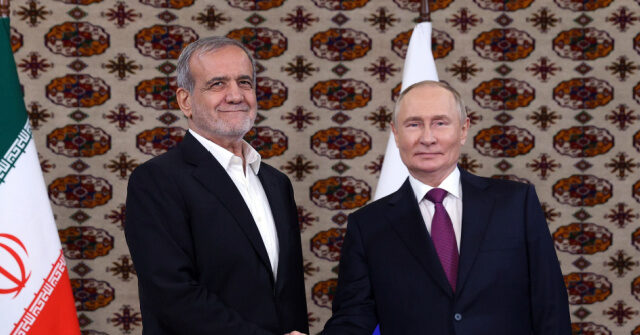On a recent meeting in Ashgabat, the capital of Turkmenistan, Russian President Vladimir Putin conveyed his commitment to fostering cooperation with Iran, particularly in the context of reshaping global power dynamics. This conversation with Iranian President Masoud Pezeshkian highlighted Moscow’s desire to establish a “new world order,” one in which Western and Israeli influences are diminished. Both leaders emphasized the increasingly synchronized positions of their nations in international affairs, particularly as they routinely align their perspectives on global events. Putin acknowledged a notable uptick in trade between Russia and Iran, further noting the strengthening of economic and cultural ties—a sentiment echoed by Pezeshkian, who expressed hopes of formalizing a comprehensive strategic partnership soon at the BRICS summit planned for later in October.
As the two nations reinforce their bilateral relations, Pezeshkian called for an acceleration in cooperation, noting that it aligns with the intentions of Iran’s leadership and aims at fortifying the partnership. While Russia does not typically operate under a “supreme leader” structure, Pezeshkian’s remarks underscored the intent of both governments to deepen their ties amid a shifting geopolitical landscape. The Iranian president also voiced concerns regarding Israel’s military efficacy, particularly Israel’s actions against Iranian proxies Hamas and Hezbollah, urging for stronger Russian support against what he termed the “Zionist regime.” This request reflects a broader Iranian alignment with Russia as both countries navigate regional instability and align against a perceived common adversary.
Reports suggest that Russia’s dependence on Iranian assistance—especially with Iranian drones—has intensified since its military involvement in Ukraine began. Furthermore, Iran’s membership in the BRICS bloc, which seeks to counterbalance U.S. and European influence globally, signifies a strategic partnership that may redefine alliances in the international arena. However, the Kremlin also exhibits caution regarding Hezbollah, as any major military engagement involving the group could disrupt Russia’s carefully constructed gains in the Middle East, particularly in Syria, where it has supported Bashar Assad throughout a decade-long civil conflict. The potential for a wider regional war prompted Russian forces to remain passive during Israeli strikes against Hezbollah targets, signaling a preference to avoid escalation that could endanger Russian interests.
The nuanced relationship between Russia, Iran, and Hezbollah reveals a complex web of strategic alignments and calculations. While Russia provided some supportive commentary about Hezbollah amidst its ongoing challenges against Israeli offensives, it remains wary of the instability that could result from a broader conflict emerging from Lebanon. Reports indicated that Hezbollah is viewed as a problematic partner within the geopolitical framework Russia is attempting to construct. Hence, despite occasional endorsements, the Kremlin appears reluctant to vocally endorse escalation against Israel, particularly given the unpredictable ramifications such a conflict would have on Russia’s achievements in the region.
Adding to the tension, the Russian Foreign Ministry expressed discontent with Western support for Israel amidst its military campaigns against groups like Hezbollah. They criticized the U.S. and U.K. for what they deemed hypocritical behavior, particularly in light of their admonishments directed at Russia regarding civilian casualties in Ukraine. Russian officials condemned Israel’s missile strikes in Syria, which have often led to civilian casualties and further escalated regional tensions. The response from Moscow indicates a desire to position itself as a defender of Syrian sovereignty and a critic of Western policy in the Middle East, as it navigates its complex stakeholder relationships in the region.
At the same time, the evolving partnerships and military strategies have not gone unnoticed on the global stage. As Russia and Iran continue to court one another amidst increasing sanctions, particularly surrounding the transfer of ballistic missiles from Iran to Russia, the European Union is gearing up for potential penalties. Such actions may heighten the already strained relations between these nations and the West and underline the precarious nature of alliances in these turbulent times. The unfolding dialogues between Russia and Iran may represent not only an aspiration towards a new epistemic framework for global governance but also serve to illustrate the fragility and volatility that often accompanies coalition-building in international politics.

